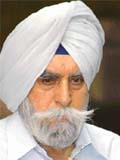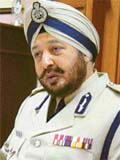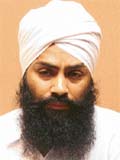Indian companies are most corrupt on Transparency Bribe Payers Index
Wednesday, October 04, 2006
NEW DELHI: In a global recognition to the "Much Merited Upper Class Rule", India has been ranked as the worst performer by Transparency International on its global Bribe Payers Index, which is based on the propensity of companies from the world's 30 leading exporting countries in bribing abroad. India has been ranked at the 30th position in the Transparency International 2006 Bribe Payers Index (BPI), with a score of 4.62. A score of 10 indicates a perception of no corruption, while zero means corruption is seen as rampant. India's major weapon supplier, Israel also ranked as one of the most bribing nation, with a score of 6.01. Israel accounted for 0.4% of global trade in 2005.
Upper castes — that is, Brahmins, Kshatriyas, and Vaishyas — constitute less than 20 per cent of the Indian population but controles the business and civil service sector of the country. They claim perhaps 80 per cent of the jobs in the new economy, in sectors such as software, biotechnology, and hotel management. The large corporates and MNCs in India prefer candidates come from the upper caste families, so that they can get their jobs done using their contacts and networks. The scores of corruption among these groups explain why they want to shut every door for the Dalits and backward communities in the name of 'Merit'.
The BPI Index results draw from the responses of more than 11,000 business people in 125 countries polled in the World Economic Forum’s Executive Opinion Survey 2006. In first place Switzerland scored 7.81 points out of a possible 10 in the BPI. Israel tied with Hong Kong with 6.01 points (Hong Kong accounted for 2.8% of global trade in 2005). The US, which accounts for the 8.9% of global trade, the highest proportion, received a score of 7.22 points. China, with 5.5% of global trade, and India, with 0.9%, closed the list.
Under BJP's rule, India became Israeli arms industry's prized market and there were also reports in 2003, of the Israeli defense establishment dispatching "scores of agents" to persuade the Indian armed forces in to buying weapons resulting in large scale bribes among civil servants and politicians. The ideological bond between Zionism and Hindutva made India as the second largest trade partner for Israel in Asia, after China. It is currently working hard with their old "Hindutva bureacrats" to make India as their "biggest trade partner". Since the advent of Hindutva's grip on the Indian elite castes, every visit by a delegation of Israeli officials either preceded or followed the cementing of ties involving the purchase of weapons, or the training and/or expansion of cooperation between Israeli armaments interests and their Indian counterparts.
In 2005, Israel has achieved a four-fold increase in the bilateral trade with India which stood at $2.4 billion. Business Week reported in 2005 that India became Israel's largest importer of weapons the previous year, accounting for about half of the $3.6 billion worth of weapons exported by that country. Not coincidentally, that year also proved to be the second best recorded year for the Israeli weapons industry, making Israel the 5th largest weapons exporter in the world and accounting for about 10 percent of the world's weapons trade. Obviously the Israeli armaments industry values India as a major new market for its weapons, and as such has much to gain from maintaining and deepening the appetite for arms by the Indian state.
The international corruption watchdog on Wednesday said overseas bribery is still common among the world's export giants despite the existence of international anti-bribery laws, while companies from emerging export powers India, China and Russia are the worst performers. Switzerland has been ranked at the top slot with a score of 7.81, followed by Sweden, Australia, Austria and Canada at the top five positions on the index. The US and UK have been ranked at 10th and sixth positions respectively.
Transparency International said that Switzerland has managed a leading score of only 7.8, which is far from perfect. This indicates there might be variations here but there are no real winners, it added.
According to the report, businesses from India, China and Russia, who are at the bottom of the index, have the most propensity to pay bribes.
This year's BPI data shows that leading exporters are undermining the development with their dirty business practices overseas, while the foreign bribery by emerging export powers is disconcertingly high.
Companies from the wealthiest countries have been ranked in the top half, but they still routinely pay bribes, particularly in developing economies, it added.
"In the case of China and other emerging export powers, efforts to strengthen domestic anti-corruption activities have failed to extend abroad," the report said.
"Bribing companies are actively undermining the best efforts of governments in developing nations to improve governance, and thereby driving the vicious cycle of poverty," said Transparency International Chairwoman Huguette Labelle.
"It is hypocritical that Organisation of Economic Cooperation and Development (OECD) based companies continue to bribe across the globe, while their governments pay lip-service to enforcing the law," Transparency International CEO David Nussbaum said.
"The enforcement record on international anti-bribery laws makes for short and disheartening reading," he added.
"Domestic legislation has been introduced in many countries following the adoption of the UN and OECD anti-corruption conventions, but there are still major problems of implementation and enforcement," he added.
The index has been prepared on the basis of responses of more than 11,000 business people in 125 countries polled in the World Economic Forum's Executive Opinion Survey 2006.
The watchdog said that India consistently scores worst across most regions and sub-groupings, while China is the world's fourth largest exporter and ranks second to last in the Index.
Transparency International Chairwoman said, "With growing influence comes a greater responsibility that should constitute an opportunity for good."
"This is the right time for Russia, China and India to commit to the provisions of the OECD Convention against bribery and contribute to the vitality of tomorrow's markets. In doing so they will become part of the effort to make corruption history."
Transparency International says the countries can be divided into four groups. In the first group - those whose companies are least likely to pay bribes - are Switzerland (which came top in the survey), Sweden, Australia, Austria, Canada, the UK, Germany, the Netherlands, Belgium, the US and Japan.
In the second group - somewhat more likely to bribe - are Singapore, Spain, the United Arab Emirates, France, Portugal and Mexico.
The third group - even more likely to bribe - are Hong Kong, Israel, Italy, South Korea, Saudi Arabia, Brazil, South Africa and Malaysia.
Finally - and most likely of all to pay bribes - are Taiwan, Turkey, Russia, China and India (which came bottom in the survey).
Before countries near the top of the list start patting themselves on the back, it's worth noting that their companies often apply different standards, according to where they are doing business. "Companies from the wealthiest countries generally rank in the top half of the index, but still routinely pay bribes, particularly in developing economies," Transpency International says. It continues:
Even high scorers are in major need of improvement. The behaviour of the Australian Wheat Board in the UN oil-for-food programme is just one example.
In March of this year, German-US motor company DaimlerChrysler admitted that an internal probe confirmed allegations of "improper payments" made by their staff in Africa, Asia and Eastern Europe.
Turkey, in 27th place, is nearly at the bottom of the BPI. This is a crucial result as the country pursues its bid for European Union membership. The poor score also raises troubling questions about the country's commitment to the OECD (Organisation of for Economic Cooperation and Development) Anti-Bribery Convention, which entered into force there in 2003 ...
The United States, which blazed new trails with its Foreign Corrupt Practices Act of 1977, ought to be leading the way, but ranks behind many OECD countries.
The United Kingdom has demonstrated minimal enforcement of the Convention, despite scandals implicating firms such as British Aerospace.
Companies often try to shrug off bribes as a way of fitting in with local customs and practices, and there is a popular notion that the recipient, not the giver, is the guilty party. Apart from the fact that such payments are often illegal, they undermine any efforts to promote good governance in developing countries. Bribes also have a corrupting effect on the firms that pay them. Often, the payments are made by local subsidiaries - allowing parent companies to pretend that their hands are clean.
Transparency International warns:
Multinationals cannot be absolved of the corrupt activities of their foreign branches, subsidiaries or agents, and they must conduct due diligence before engaging with joint venture or alliance partners. The purchasing, export, and marketing and sales departments remain the business functions most vulnerable to bribery and corruption.
It adds:
The cost of a tarnished image "back home" can be immense. And companies with a culture of bribery overseas face a heightened risk of being undermined by the unethical acts of their own employees. In the long run, it pays for companies to take proper measures to end corrupt practices.
About 150 years ago, there were no Black Chief Executive Officers (CEOs) in the US, there were no rights for Blacks and there was no cultural influence from Blacks. But now, 75 Black CEOs are working in major US companies. On the contrary, there are no Dalits as CEOs in any private company in India today.
In 1930, the IBM Company in America gave reservation to Blacks, and at present almost all business houses there are accommodating Blacks, Native Americans, and Hispanics. Since the intention of our Govt. is not to empower Dalits otherwise on similar lines how US had done for Blacks and others, Dalits can be given participation in govt. contracts and the supply-chain of different articles. After millennia of oppression, it was the British in 1932 which gave reservation through the historic Poona Pact. English and public school education in India is undoubtedly out of reach for Dalits, and this is resulting in lack of English knowledge which is blocking Dalits to take up high profile jobs.
In India, the perception is that if you are a Backward then you do not deserve anything. And the worst is that the Backward is being touted as the hurdle to the ushering in the era of competitiveness. The reservation policy is only to deceive the rest that we have been properly taking care of the Backwards. But India is absolutely clueless about what results have been achieved through the huge money allocated and the policies being pursued for the development of SC/ST/BCs over the last 50 years. According to NSSO, Census of India and NFHS-II, 37 percent of Dalits living below poverty in India while 45 percent them don't know how to Read and Write. When any insurgent or terrorist strikes, the ready answer is: "foreign hands bent upon to destabilizing our social fabric and economy". If the reservation is introduced, our industrial giants would put the blame on reservations.
The Govt. of India protected our industry from foreign direct competition. Are they not reservations? If they talk of survival on the basis of "merit" then let the Indian market be open to foreign companies.
Who is to blame for the dismal performance of PSUs or their closure? Why do we forget that "meritorious" professionals are heading most of the PSUs since their inception? Why only PSUs enjoying a monopoly in the Indian economy are doing well? In whose interests a few PSUs (even the profit-making ones) are forced to either close down or are sold to private parties at a paltry sum?
When a person born Untouchable as per the Hindu caste system is condemned to carry the cross then why is this bogey of "merit" raised constantly by the educated elite? Let us not forget that a caste-ridden society like ours hardly provides a level playing field for a large section of Indian society. A person's station in life is largely determined by birth. In such a system, there is little space for "merit" and efficiency. The recruitment practices in the private needs scrutiny. The upper castes have been enjoying unstated birth-based reservation since centuries. And extending the benefits of reservation to Backwards at any cost can only neutralize this. When can we see 17.5% IAS officers from Dalits, 27.5% from backward communities and 7.5% from tribal?
Someone who is familiar with the Indian social fabric know the age old doctrine of exclusion legitimised and sanctified by the Brahminical ideology. This upper caste elite controles the Business and Civil Service structure in India, by culminating "Bribing" as a ‘routine matter’ in India's daily life. Transparency International's BPI Index proves how this dangerous ideology of "self purity and pollution" has extended its wings to the "Globalization of Corruption."
--------------------------------------------------------------------------------
Tehelka's three rules of graft for arms-dealers.
1. If it's a bit dodgy, do it in cash.
2. If it's unethical, outsource it.
3. If its totally illegal, do it through the MOD's licensing procedure.
---------------------------------------------------------------------------------
Download the Transparency International Report from
http://www.transparency.org/news_room/in_focus/bpi_2006
Related Information
Transparency International India
Balwantray Mehta Vidya Bhawan-ASMA,
G. K. Part II,
New Delhi 48
Contact Person:
Dr S.K. Agarwal Phone +91-11-2922 4519 Fax +91-11-2646 8025
Website: Transparency International India





